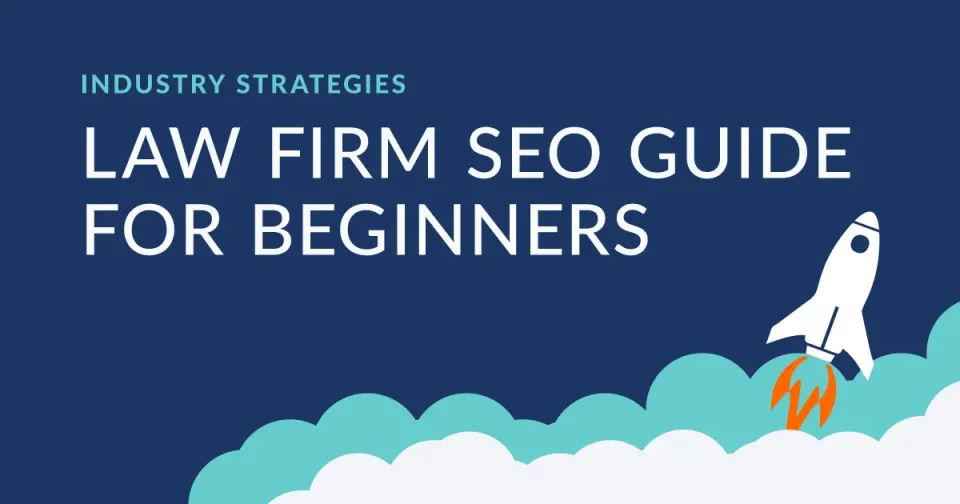
There is an inherent challenge for law firms to stand out amongst an increasingly crowded landscape online. You could be running a stellar practice, but potential clients can’t find it. It’s disheartening.
We covered defining Search Engine Optimization (SEO) in an academy post here, but basically it is the practice of growing website traffic through organic search results. The great thing about organic traffic is that it is continuous as long as you rank.
Authority Pilot understands the struggle of showcasing your talents online. We offer PPC advertising with Google Ads Management and Social Media Ads Manager services. Those do work, but you need to compete for expensive law-related keywords. Law firm SEO allows you to take advantage of those keywords’ popularity without the ad budget. Our SEO Management for law firms offers precisely the organic traffic solution you are looking for, but for those looking to assess their current situation or (gasp!) put in the time to conquer it — well, we have provided a thorough guide to help you do just that.
Your challenge – should you choose to accept it – is to check off the 40+ essential boxes that will help you dominate online. Further, we’ve create a Google Sheet to help guide your efforts, as well as links to the supporting documentation found below on this page.
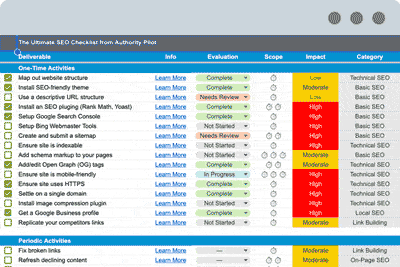
The Ultimate Legal SEO Checklist
Get your copy of our Ultimate Legal SEO Checklist for 2024. Unlock tips, tricks, and tools to rocket your website's search engine rankings. Whether you're a seasoned pro or just starting, this checklist is your secret weapon.
Law Firm SEO: One-time Activities
This list of One-time SEO Activities section contains all the crucial tasks that you need to tackle to give your website the SEO foundation it needs for future success. It’s a set of essential tasks that, once completed and done right, will continue to benefit your website’s search engine performance in the long run. From setting up Google Analytics and Google Search Console to creating a sitemap and submitting it for indexing, these activities lay the foundation for your website’s SEO success. So, roll up your sleeves and dive into these essential activities to fortify your law firm’s online presence with the SEO essentials that will propel it to new heights in search engine rankings.
1. Map out website structure
Mapping out your website’s structure for SEO is like creating a roadmap for both users and search engines. It’s all about making navigation smooth and logical. Start with a clear homepage that branches out into categories or sections, like chapters in a book.

Each section should have its own unique content, and the pages within them should be easily accessible from the main menu. When you structure your website this way, you’re not only making it user-friendly but also sending strong SEO signals to search engines, helping them understand your content hierarchy and boosting your chances of ranking higher in search results.
2. Install an SEO-friendly theme
Choosing the right theme for your website is crucial. Look for themes that are SEO-friendly, meaning they are designed to be easily indexed by search engines and provide a smooth user experience. A well-structured theme will ensure your content shines and loads quickly, enhancing your SEO efforts.
3. Use a descriptive URL structure
Crafting user-friendly and descriptive URLs is essential. Avoid long, convoluted URLs filled with random characters. Instead, use URLs that clearly describe the content on the page. Clean and concise URLs not only help SEO but also make it easier for users to share and remember.
Fortunately, this is easy enough to change. On new WordPress sites, go to Settings > Permalinks > Post name.
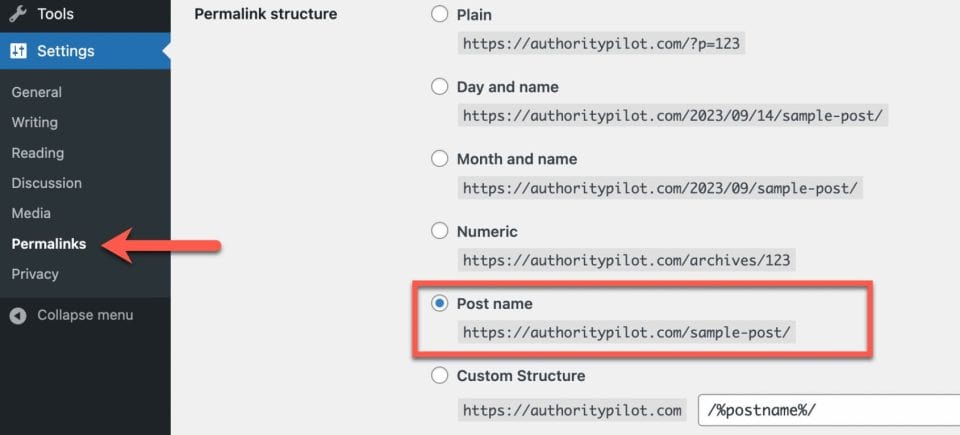
For existing sites, note that changing the permalinks structure can wind up doing more harm than good, in which case it is likely best to stick to the suboptimal structure.
4. Install an SEO plugin
To supercharge your SEO efforts, install an SEO plugin like Rank Math or Yoast SEO. These plugins offer valuable features like optimizing meta titles, meta descriptions, and providing real-time SEO suggestions. They’re user-friendly tools that make on-page SEO a breeze.
We heartily endorse using Rank Math. It makes it easy to understand ways to improve your content.

Talk Strategy with a Fractional CMO
SEO. More SEO traffic with higher conversion rates.
Paid Media. Paid strategies with clear ROI.
Content. Epic content that attracts and gets shared.
5. Setup Google Search Console
Google Search Console is a treasure trove of insights about your website’s performance in Google’s search results. Set it up to monitor keywords you rank for, your site’s indexing status, search queries, submit sitemaps, and any potential issues that need attention. It’s a must-have for any website owner.
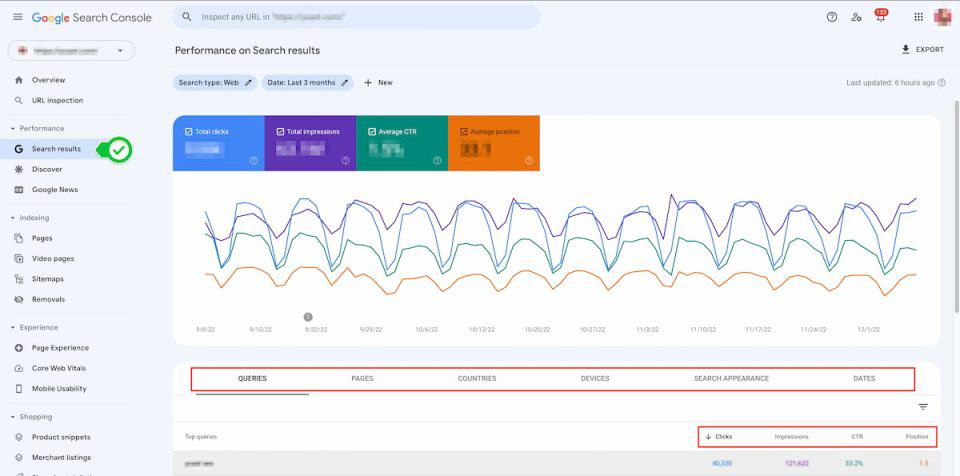
Follow these instructions from Google to get started.
6. Setup Bing Webmaster Tools
Don’t forget about Bing! While Google is the dominant search engine, Bing still commands a notable share of the market. Setting up Bing Webmaster Tools ensures your site is also optimized for Bing’s search results.
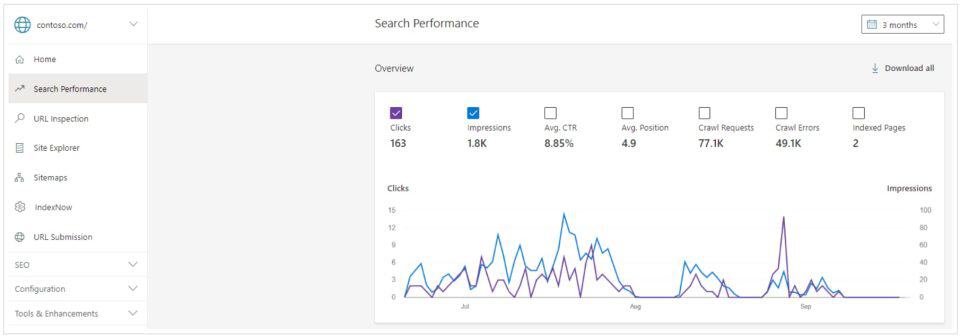
While admittedly not as important as its counterpart above, this is still a box worth checking off.
7. Create and submit a sitemap
A sitemap is like a roadmap for search engines, guiding them to all the important pages on your site. Generate a sitemap and submit it to Google and Bing Webmaster Tools. It’s a simple step that can boost your site’s visibility.

Sitemaps are typically named sitemap.xml or sitemap_index.xml, but if you’re having trouble locating it, you might try looking in your robots.txt file.
SEO plugins such as Rank Math and Yoast SEO provide the ability to handle sitemaps and configuration.
8. Ensure site is indexable
Check that search engines can crawl and index your website. Ensure that your robots.txt file and meta robots tags allow indexing, so your content can be discovered.
The most reliable method for checking if your page is indexed is by using Google Search Console. Simply select “URL Inspection” from the left sidebar menu, enter your URL and click “Test Live URL”. The result with either show up as “URL is on Google” or “URL is not on Google”. And you’ll have your answer.
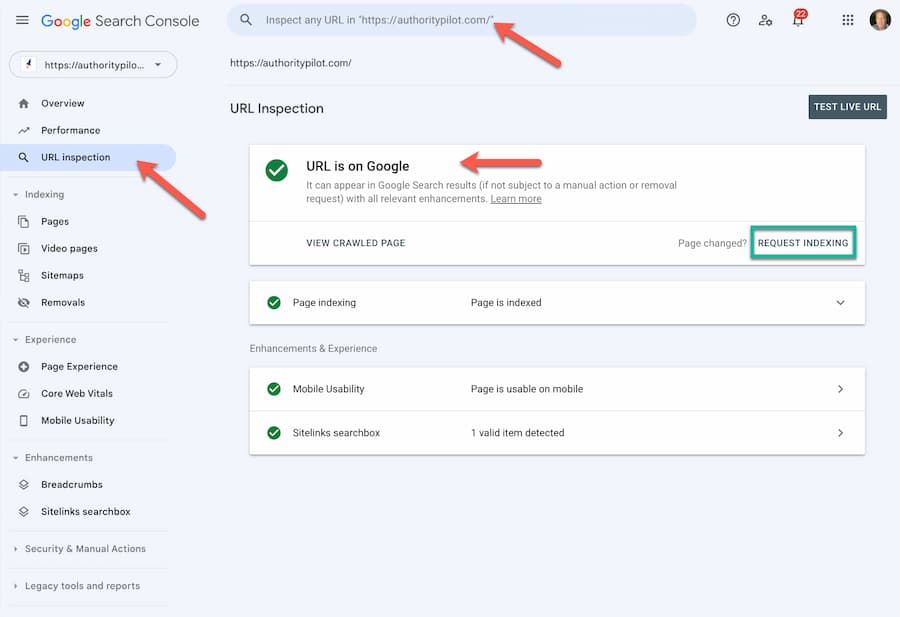
Power Tip: In the event you modify page content, for example to correct an on-page error, this page is where you can “Request Indexing” to have Google recrawl your page.
9. Add schema markup to your pages
Schema markup provides search engines with additional context about your content. Implementing schema can lead to rich snippets in search results, enhancing your website’s visibility and credibility.
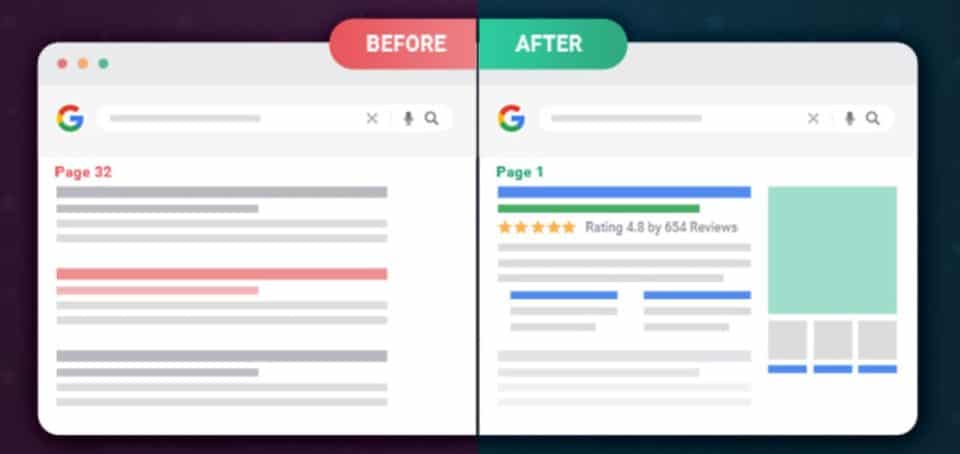
For more information, check out Configuring “Schema Markup” in Rank Math.
Adding or editing Open Graph (OG) tags is like giving your website a snazzy virtual business card for social media. You know when you share a link on Facebook or Twitter, and it magically shows a catchy title, a cool image, and a little blurb about the page? Well, that’s all thanks to OG tags! They’re like the behind-the-scenes rockstars of social sharing. These tags help your content to stand out when shared on platforms like Facebook, Twitter, and more, making people more likely to click, read, and engage with your content. So, go ahead and add or spruce up those OG tags — your website’s social media game will thank you.
11. Ensure site is mobile-friendly
Mobile-friendliness is not just a good practice; it’s a necessity. Google prioritizes mobile-friendly websites in its rankings. Ensure your site looks and functions well on smartphones and tablets. You can check to see how mobile-friendly your site is with the Mobile Usability report in Google Search Console or by using Google’s mobile-friendly test tool.
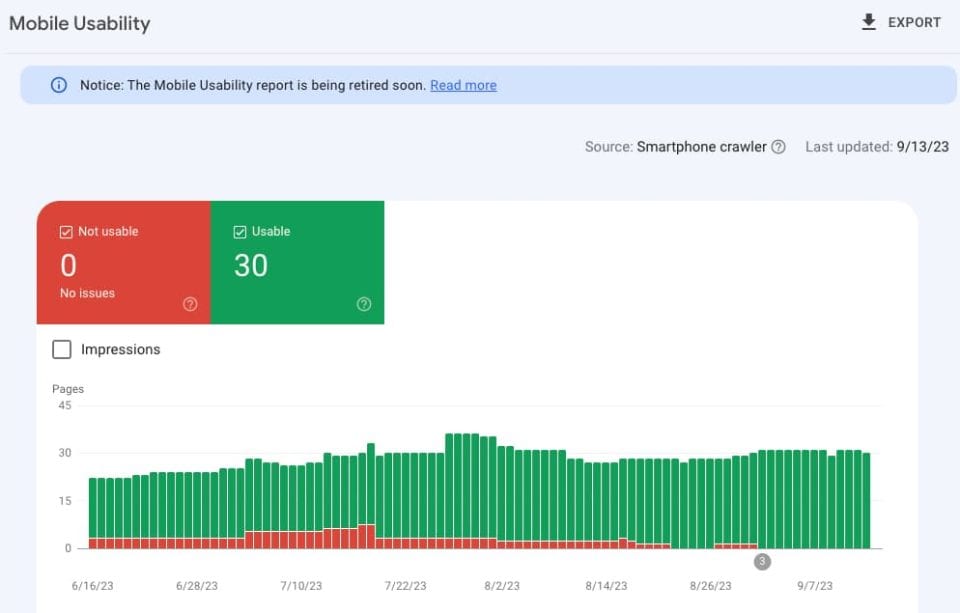
12. Ensure site uses HTTPS
Website security matters. Switch to HTTPS to encrypt data between your website and users’ browsers. Google considers HTTPS a lightweight ranking factor, so it’s essential for SEO and user trust. If your website is using HTTPS, it will show the “lock” icon on your browser.

Many platforms provide these certificates for free, otherwise you can acquire a free certificate from Let’s Encrypt HTTPS.
13. Settle on a single domain
Choose one preferred domain (with or without “www”) and set up canonicalization to avoid duplicate content issues. Consistency in your domain usage is crucial for SEO. You can use httpsstatus.io to confirm everything is working.

14. Install an image compression plugin
Optimize your images for the web by using image compression plugins. Large, uncompressed images can slow down your site, and slow sites aren’t SEO-friendly. Image compression plugins work to reduce the file size of your images without sacrificing quality. This means your pages load faster, and an overall improvement in site performance. When your website loads swiftly, it leads to a better user experience, lower bounce rates, and higher search engine rankings.
Platforms such as Wix and Shopify compress images automatically, but for WordPress we use ShortPixel Image Optimizer.
15. Get a free Google Business Profile
If your website represents a local business, claim and optimize your Google Business Profile. It helps your business appear in local search results and on Google Maps.
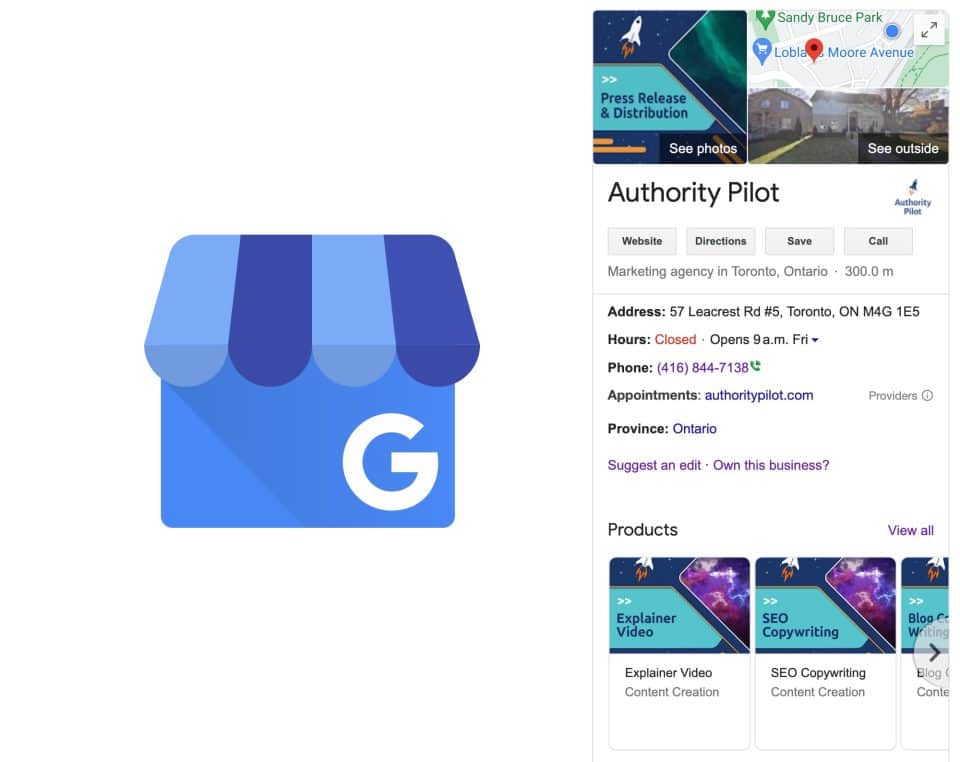
If your business depends on local SEO, establishing your Google Business Profile is likely the most important thing you can do. Providing you haven’t already done so, you can claim your business here.
Further Reading:
How to Build Backlinks on Your Google Profile
16. Replicate your competitors links
Analyze your competitors’ backlinks and identify opportunities to replicate or build similar high-quality links. Use backlink analysis tools like Ahrefs or Moz Link Explorer to uncover their link-building strategies. Pay attention to the websites linking to them and the specific pages they’re linking to. Are there any opportunities for you to get similar links? Reach out to these websites, showcasing why your content or offerings are equally valuable, if not better. Building relationships in your niche can lead to link-building opportunities too. But remember, it’s not about blindly copying; it’s about learning from your competitors and finding unique ways to earn those coveted backlinks.

The Ultimate Legal SEO Checklist
Get your copy of our Ultimate Legal SEO Checklist for 2024. Unlock tips, tricks, and tools to rocket your website's search engine rankings. Whether you're a seasoned pro or just starting, this checklist is your secret weapon.
Periodic SEO Activities
Periodic activities include tasks like content updates to keep your information fresh, checking for broken links that might frustrate your visitors, and assessing your keyword strategy to ensure you’re staying relevant in search results. It’s all about keeping your digital presence polished, user-friendly, and search engine-friendly.
Below is a list of semi-regular SEO activities to engage in.
17. Fix Broken Links and 404 Errors
Broken links are like potholes. Fixing them ensures visitors have a smooth ride, while also helping search engines navigate your site without stumbling.
You can use the free W3C Link Checker to identify broken pages. To see only the relevant output, enter your website and in the Options choose “Summary only”.
Alternately, you can identify broken links using Google Search Console. To access the results once Google crawls your site, click on Indexing > Pages and in the report look for “Why pages aren’t indexed” and click on “Not found 404”. This will provide you with a list of pages on your website that are not indexed or served on Google.
The cure for broken links is redirects. SEO tools such as Rank Math include redirect features where you can add your page and forward accordingly.
18. Refresh declining content
Think of this as giving your old blog posts a makeover. Refreshing declining content means updating it with new information, better visuals, and a dash of SEO magic to make it sparkle again.
To find declining content on your website, look no further than Google Search Console. Grab the search performance report, use the date filter and pick the Compare mode.
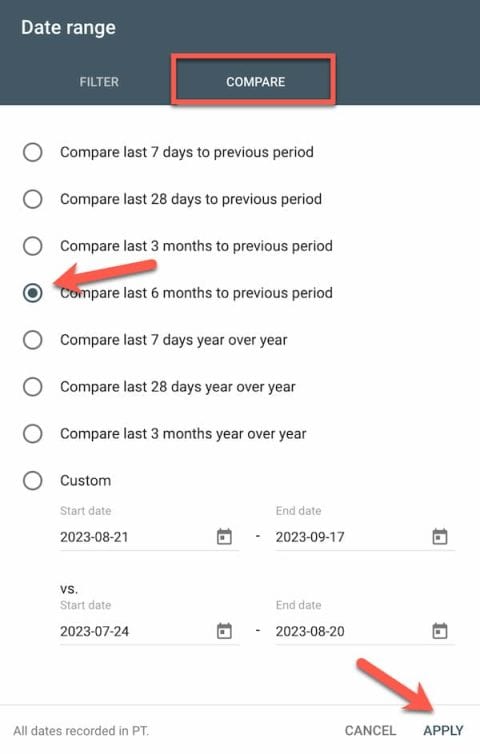
Then click the pages tab in the title and you’ll be able to identify declining content candidates from your website content.
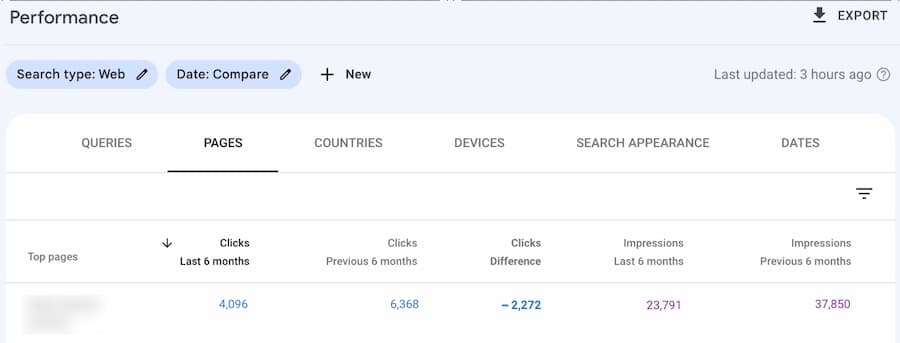
19. Conduct a content audit
Completing a content audit for your website is like a thorough check-up to ensure it’s in top shape. Start by compiling a list of all your existing content—blog posts, articles, pages, everything. Then, evaluate each piece for relevance, quality, and performance. Identify outdated or irrelevant content that needs to be updated or removed. Look for opportunities to refresh and improve existing articles with updated information and keywords. Pay attention to on-page SEO elements like meta titles, descriptions, and headers. Don’t forget to analyze user engagement metrics, such as bounce rate and time on page, to gauge content effectiveness. The goal? To have a lean, mean content machine that delights users and impresses search engines, ultimately boosting your SEO rankings.
Further Reading:
How to Conduct a Content Audit
20. Conduct a content gap analysis
Conducting a content gap analysis begins with listing your target keywords and phrases you want to rank for. Then, use SEO tools like Ahrefs or SEMrush to identify your competitors and their top-ranking pages. Analyze their content and see where they’re hitting the mark that you might be missing. Pay attention to content types, topics, and keywords they’re ranking for but you’re not. The goal is to spot gaps in your own content compared to the competition. Once you’ve identified these gaps, create new, valuable content to fill them. It’s like giving your website a makeover with all the missing pieces in place, and search engines will thank you for it with better rankings and increased visibility.
21. Conduct site speed tests
When your website loads quickly, it’s not just about a smooth user experience; it’s a direct signal to search engines that you mean business. Google loves speed and rewards it with higher rankings. So, don’t let sluggish loading times drag you down. Conduct regular site speed tests to identify bottlenecks, optimize your website’s performance, and rev up your SEO game.
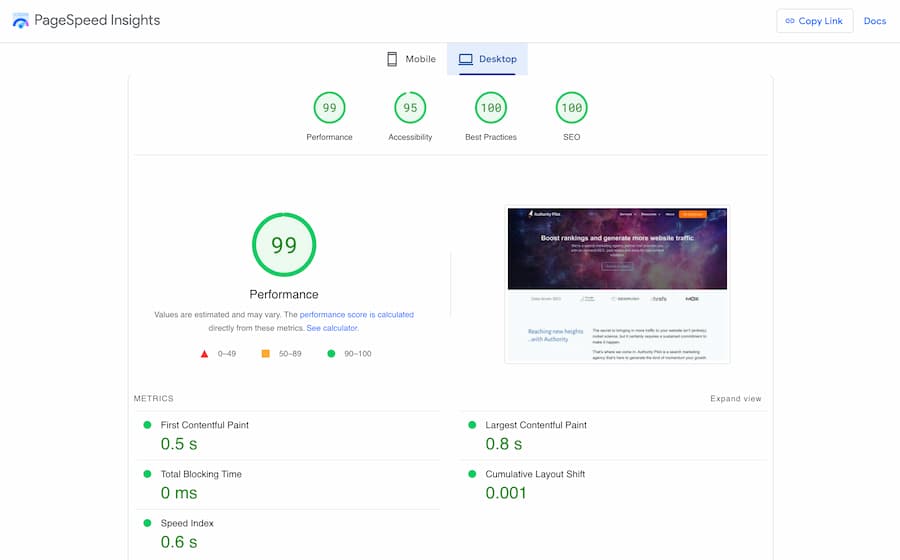
Using Google’s PageSpeed Insights tool will highlight what’s slowing your site down and provide actionable suggestions on how to fix it. Use it to gain a faster, more SEO-friendly website.
22. Conduct a backlink audit
Conducting a backlink audit for SEO is like giving your website’s backlinks a health check-up. Start by compiling a list of all your backlinks using a tool like SEMrush or Ahrefs. Analyze each backlink for quality, relevance, and authority. Look out for toxic or spammy links that could harm your SEO efforts and disavow them using Google’s Disavow Tool. Identify broken or redirected links and fix them to ensure a seamless user experience. Pay attention to the anchor text used in your backlinks to make sure it aligns with your content and keywords. Keep an eye on the growth and trends of your backlink profile to see what’s working and what needs improvement.
23. Competitor stalking
Sounds fun, right? Think of it as friendly rivalry. Or perhaps a cage match. Stalking your competitors is about obtaining valuable insights. Start by identifying your top competitors—the ones ranking high for your target keywords. Then, dive into their online presence. Scrutinize their content, dissect their keywords, and take note of their strategies. Tools like Ahrefs or SEMrush can be useful in this regard. Examine their backlinks—where are they coming from and what’s the quality? Don’t forget to also spy on their social media activity and user engagement. It’s not about copying but learning from their successes and mistakes. This intel will help you refine your SEO strategy, uncover new opportunities, and, ultimately, outrank the competition.
24. Update Google Business Profile
Your Google Business Profile serves as a digital storefront. Keeping it fresh and accurate helps people find you in the real world. But as we say time-and-time again, Google loves Google. There are rewards for playing within their ecosystem.
Maintain your profile regularly with updates for holiday hours and products/services. Furthermore, use this channel to share fresh content using the “posts” feature to keep your followers up-to-date.
Further Reading:
How to Build Backlinks on Your Google Profile
25. Social media love
Social media is a powerful way to get noticed and drive more traffic to your website. When you share your content on social platforms, you’re opening up new avenues for people to discover your website and link to it. Plus, social signals such as likes, shares, and comments send out positive vibes to search engines, telling them that your content is relevant and engaging. This can boost your rankings and visibility in search results. So, don’t underestimate the social media impact — it’s not just about likes and followers; it’s about turbocharging your SEO and reaching a broader audience.
26. Continue link building
Link building is the secret sauce of SEO, and here’s why it’s a big deal. When other websites link to yours, search engines like Google see it as a vote of confidence and legitimizing the value of your content. This boosts your website’s authority and can lead to higher rankings in search results. But here’s the caveat: not all links are created equal. Quality matters more than quantity. You want links from reputable, relevant websites in your niche.
Building high-quality backlinks from reputable sources shows search engines that your site is a trustworthy source. You can spend the time it takes to learn how to build out your own link profile, or outsource to a search marketing agency. Authority Pilot provides a variety of scalable à la carte solutions with on-demand access to services like Link Outreach, Link Insertions, and Business Listings.
Now, for some tips on the link-building game: First, focus on creating killer content that others will naturally want to link to. Quality content is like a magnet for backlinks. Second, reach out to other websites in your niche and build relationships. Guest posting or collaborating on projects can lead to valuable backlinks. And third, monitor your backlink profile regularly to ensure you’re not getting spammy or toxic links that can hurt your SEO.
POWER TIP: Using your Google Business Profile to create backlinks is one method to consider, although the more impactful strategy is to build quality backlinks using Link Outreach and Link Insertions that have a long-term impact on your rankings.

The Ultimate SEO Checklist
Get your copy of our Ultimate SEO Checklist for 2024. Unlock tips, tricks, and tools to rocket your website's search engine rankings. Whether you're a seasoned pro or just starting, this checklist is your secret weapon.
Regular SEO Activities
The benefits of blogging for business have been well laid out. The frequency of blogging, however, has been debated for years. Most experts agree that blogging 2-4 times per week is the best way to see increased traction from your SEO efforts. And if you find yourself in the “OMG no chance I have the time or team to create 16 blog posts a month” category, the good news is… you don’t have to! Our Blog Content Writing service allows you to easily order up a plan that suits your unique needs and industry. You get to choose based on content quality and word count. Set your project to reoccur monthly with the ability to cancel at any time. It’s a no-brainer when you think of the time and resources you’ll save.
The activities below go hand-in-hand with each article and page you create on your website.
27. Monitor analytics and Google Search Console
Analytics and Google Search Console are your key players in climbing the ranks in SEO.
Analytics gives you the lowdown on what’s happening on your website – who’s visiting, what they’re clicking, and how long they’re sticking around. It’s your detective tool to uncover what’s working and what needs fixing.
On the other hand, Google Search Console is like a direct line to Google’s brain. It tells you how Google sees your site, flags any issues, and lets you submit your sitemap.
Together, they’re your dynamic duo for SEO success. Maintain a regular frequency of checking your progress, spot opportunities and fix problems. Then you’ll be climbing those search engine rankings like a boss!
28. Find a primary keyword to target
Finding that perfect primary keyword for your SEO strategy starts with brainstorming potential keywords related to your content. Then, use keyword research tools like Google Keyword Planner, Ahrefs, or SEMrush to assess their search volume and competition. Aim for keywords that strike a balance between being highly searched and having manageable competition. Long-tail keywords (phrases with more words) can be your secret weapon, as they often have less competition and more specific user intent. Once you’ve picked your primary keyword, build your content around it naturally, making sure it fits contextually and provides value to your audience. Remember, it’s not just about ranking; it’s about serving the needs of your readers while staying relevant in the SEO game.
29. Determine search intent
Determining search intent for SEO is about figuring out what people are truly looking for when they type a query into that search bar. When you understand their intent, you can create content that matches it like a glove.
Searches primarily fall into one of these categories:
- Blog post
- Interactive tool
- Video
- Category page
- Product page
Figuring out which of these apply to your visitors is known as assessing search intent. Are they seeking information, looking to buy something, or trying to find a specific website? So, whether it’s informational, transactional, or navigational, deciphering search intent will help you serve up content that ranks high, gets clicks, and keeps visitors happy.
How do you determine search intent?
Start by examining the search query itself—what keywords are used, and are they specific or broad? Look at the top-ranking pages for that query; they’re clues to what search engines think users want. Analyze the content on those pages. Are they mostly informative, transactional, or navigational? Don’t forget to check out the SERP features; they reveal what Google believes best matches the intent. And last but not least, put yourself in the shoes of the searcher. What would you expect to find if you typed in that query? By combining all these elements, you’ll be on your way to becoming an SEO detective, uncovering the secrets of search intent, and crafting content that hits the mark every time.
Let’s look at an example of search intent shared by the ahrefs team. They use the search terms “excel for beginners” and video content dominates, and “days between dates” that is populated by interactive tools.
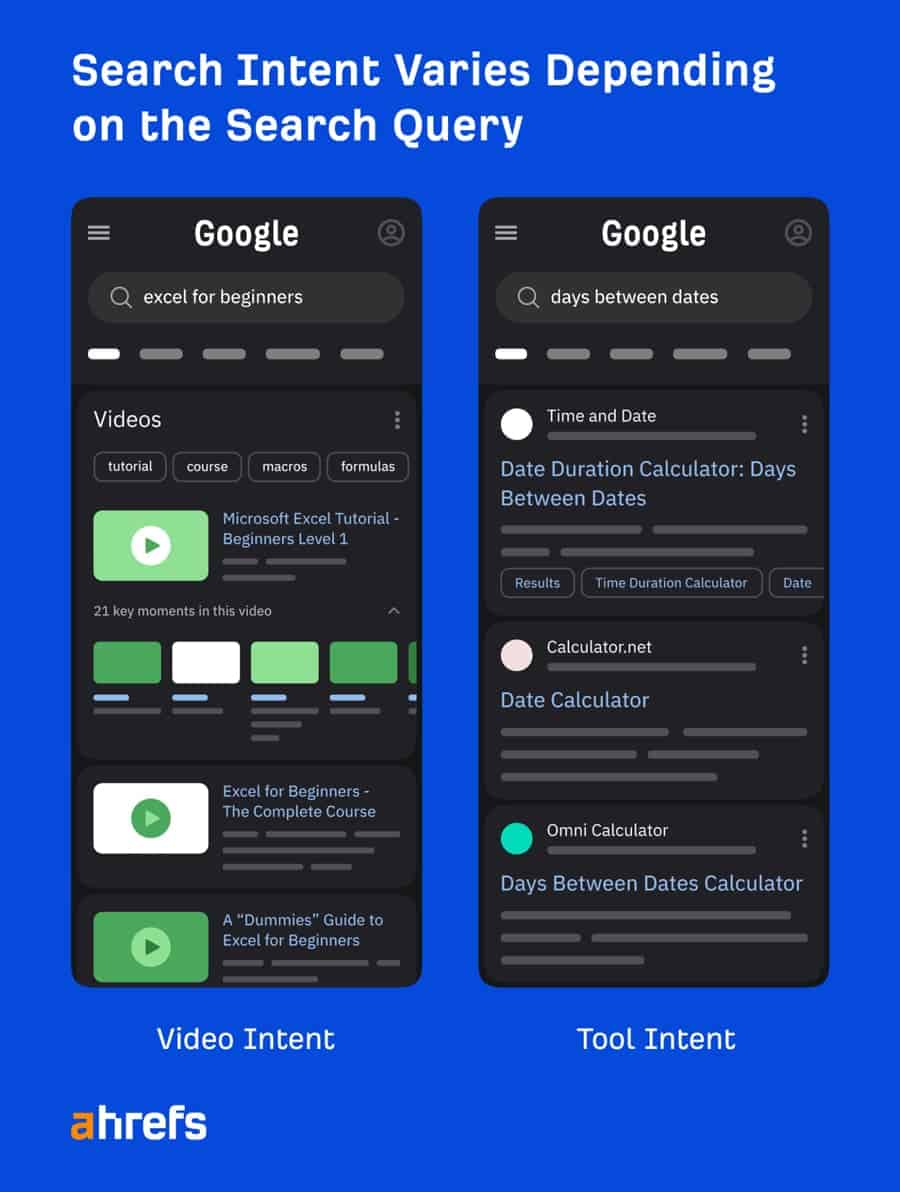
30. Research content people crave
Researching content that people crave starts with tuning into your target audience’s conversations on social media, forums, and comments sections to uncover their burning questions and pain points. Keyword research tools like Google Keyword Planner and tools like AnswerThePublic can help you identify popular search queries. Keep an eye on trends and hot topics in your niche through Google Trends and industry news. Don’t forget to spy on your competitors to see what’s working for them. And lastly, surveys and direct feedback from your audience can be goldmines for content ideas. The key is to stay curious and attentive to your audience’s needs.
31. Optimize headings and subheadings
Headings and subheadings are like signposts on a road trip. They help readers navigate and understand your content easily. Google looks at headings and subheadings to better understand a page’s content.
For example:
- <h1> Pet Food
- <h2> Dogs
- <h3> Kibble
- <h3> Canned
- <h3> Raw
- <h2> Cats
- <h3> Dry
- <h3> Wet
- <h3> Semi-moist
- <h2> Dogs
Header tags provide structure and context for articles. They break up blocks of text with subheadings, thereby making your content more scannable. Plus, they’re a logical place to include related keywords.
With each article you create, be sure to structure with headings and subheadings for optimal results.
32. Hook readers with great blog post intros
The first few seconds is your make-or-break opportunity to grab a reader’s attention and keep them reading. Come up short in your intro and they don’t read your content, they won’t take actions like sharing, linking, or converting. To generate compelling a compelling intro, the PAS copywriting formula is a good place to start.
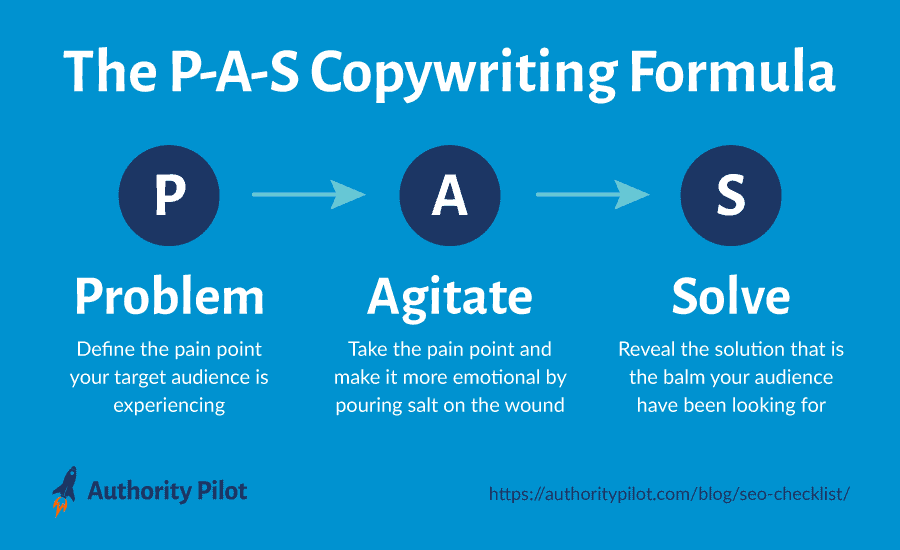
For example, let’s look at an example for a fitness app.
Problem: “Are you struggling to stay motivated and reach your fitness goals?”
Agitate: “You’ve tried countless diets and workout routines, but then enthusiasm fizzles and you’re back to square one.”
Solution: “Now imagine that you’ve found a fitness app that not only tracks your progress, but also gives you personalized workouts and daily motivation. Say hello to our Chump-2-Champ app. It transforms your fitness journey and keeps you on track to a healthier, fitter lifestyle.”
33. Edit copy for simplicity
Winston Churchill once said, “Out of intense complexities, intense simplicities emerge.” Clarity wins hearts and minds, and the man spoke with a voice that resonated with people of all ages and levels of education.
When you use plain, clear language that’s easy to understand, you’re not only catering to a broader audience, but also gaining points with search engines. Google and friends appreciate content that’s user-friendly because it aligns with their mission to provide the best possible results to users. Plus, straightforward content is more likely to be shared and linked to, which are like gold stars in the SEO world. Think simple and relatable – it’s the SEO recipe that speaks to both humans and search engine bots alike.

Talk Strategy with a Fractional CMO
SEO. More SEO traffic with higher conversion rates.
Paid Media. Paid strategies with clear ROI.
Content. Epic content that attracts and gets shared.
34. Link to relevant resources
Share the love by pointing readers to trusted sources. It shows you’re well-connected in your field and improves credibility.
When you link to authoritative, related sources, you show search engines that you’re all about providing value. They love that! Plus, it keeps readers engaged and makes your content more informative. Linking to relevant resources can also lead to backlinks. When other websites see your content as a valuable resource, they’re more likely to link back to you, boosting your website’s authority and rankings.
35. Add visual goodies
Walls of text discourage consumption appealing and tend to overwhelm rather than engage. By adding images and graphics to your content, it brings your story to life and captivates your audience. In the SEO world, this visual appeal is more important than you might think. Images not only make your content more engaging and shareable but also provide a valuable opportunity to use keywords in alt text and file names, which can boost your SEO. Moreover, when your content includes eye-catching visuals, visitors tend to spend more time on your site, reducing bounce rates and sending positive signals to search engines. So, whether it’s a jaw-dropping infographic or a relatable meme, don’t hesitate to sprinkle your content with images and graphics—your SEO and audience will thank you for it!
36. Image optimization
When you optimize your images, you’re not just making your website look good; you’re also telling search engines what your pictures are all about. It’s like giving them eyes to see. Properly named image files and alt tags provide context that search engines use to understand your content better. Plus, optimized images load faster, improving your website’s overall speed and user experience, which search engines adore. If you want your website to run smoothly, rank higher, and engage users effectively, take the time to properly optimize images and graphics on your website.
37. Create compelling title tag and meta descriptions
These elements are the first things users see in search results, and they can make or break that click. A captivating title tag and meta description not only entice users to click but also give search engines a clear signal about your content’s relevance. When they match the content and include relevant keywords, it’s like waving a giant flag that says, “This is what you’re looking for!” Higher click-through rates and better alignment with search intent can lead to improved rankings. So, don’t underestimate the power of your title tags and meta descriptions.
38. Set SEO-friendly URL slug
Setting an SEO-friendly URL slug gives your webpage an online address. Make it short, sweet, and easy to find. It helps both users and search engines understand what your page is all about. When your URL slug matches the topic of your content, it makes it easier for people to guess what they’ll find when they click. Plus, search engines love it when everything lines up neatly – your title, content, and URL. It’s like you’re telling them, “Hey, I’m super relevant!” This can lead to better rankings because search engines can quickly figure out what your page is about and who would find it useful.
39. Add schema markup for rich snippets
Adding schema markup for rich snippets is your ticket to standing out in the crowded search engine landscape. When you use schema markup for your articles, you’re providing search engines with extra information about your content, such as ratings, reviews, product prices, and more. This extra info shows up in search results as eye-catching snippets, making your listing more clickable and attractive to users. Not only does it boost your click-through rates, but it also helps search engines understand your content better, potentially leading to improved rankings.
40. Include a Table of Contents where appropriate
Including a table of contents in your content is like rolling out the red carpet for both readers and search engines. It’s all about making life easier. For your readers, it’s a roadmap – they can quickly see what your content offers and jump to the sections that interest them most. This keeps them engaged and satisfied, which can reduce bounce rates and improve dwell time, two factors Google loves. Plus, when search engines crawl your page and see a table of contents, it helps them understand your content’s structure and hierarchy.
If you’re aiming to improve your SEO and user experience, a table of contents is a small yet powerful addition that can make a big difference.
41. Connect the dots with internal links
Internal links are akin to hidden treasure. They connect the dots within your own website, guiding both users and search engines through your content. When you link one of your pages to another, it’s like saying, “Hey, check this out, it’s related!” This not only keeps visitors on your site longer, reducing bounce rates, but it also spreads link authority across your pages. This means that the SEO juice you’ve earned on one page can flow to others, helping them rank better in search results. So, when you’re crafting your content, don’t forget to sprinkle those internal links to improve your website’s SEO and user experience.
42. Promote content with outreach
So you’ve crafted your content masterpiece. Now what? Share your content with the world like a boss! Repurpose as social media posts, promote by using your email list, or elevate using services like our Link Outreach, Link Insertions, and/or Content Syndication to access larger audiences, increase brand visibility and gain valuable backlinks.
Further Reading:
Link Building Strategies: Link Outreach vs. Link Insertions
Summary
Staying on top of SEO is increasing in importance. There’s actually too much to leave to memory, no matter how seasoned you are. That’s why a checklist can serve as a powerful reminder of ways to propel rankings. Be diligent, patient with the process, and results will follow.







